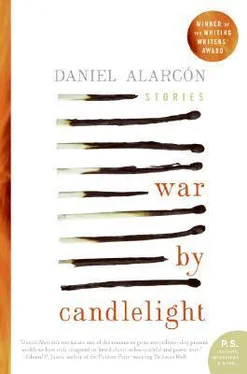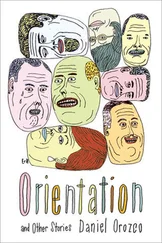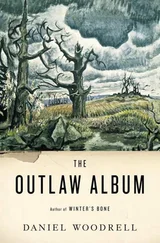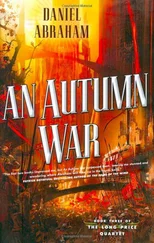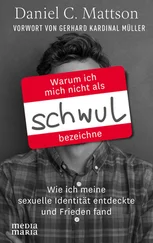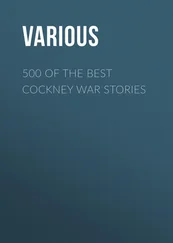“The doctor wanted to examine it,” I said, “just to make sure.”
Carrión nodded. “Of course. Good luck.” He stood up to leave, unfolding himself, clearing grass from his knees. “You should put it out of its misery, you know. No point in being cruel.”
I liked him. How simple and mundane.
I thanked the officer and assured him I would. We were pulling away, our good-byes restless on our tongues, when suddenly there was a noise, an abbreviated yelp. Looking up, I saw one of my compañeros, breathless, not thirty meters away, crouching savagely over a dog (white), holding it up by its muzzle, arm raised, knife in hand, poised to enter the fleshy underside of its neck. He had come down a side street and hadn’t seen us until it was too late. Now he saw us and stopped. Confusion. Panic. Fearful, I reverted to form, abandoned my revolutionary training: I wanted to paint it, the brutal outline of a man at war with a mutt, caught in the act, frozen arms akimbo. I saw what I had looked like. Carrión looked my way, puzzled, then back at my compañero, and for a moment the three of us were caught in a triangle of wants, questions, and fears — a record skipping, a still life, a mutually-agreed-upon pause during which we each considered in silence the intricate and unfortunate relationships that connected us. An instant, nothing more.
Then Carrión drew his gun, just as I grasped my knife. My compañero let the dog drop unceremoniously to the sidewalk and took off running down the avenue away from the plaza. The white dog scampered off, still whimpering. And Carrión faced me, whatever shadow of friendship we had briefly cultivated lost in fog. My options ticked off before me like the outline of a brutal text: (A) stab the cop, quickly; (B) run, run fast, imbecile! (C) die like a man. And that was all my mind produced. Despairing, only my last choice made any sense. Can it even be called a choice? I held my blade, true, but weakly and without conviction. I made as if to rise, perhaps even run, but there was nothing there. And while I dawdled with limp and half-formed thoughts, Carrión acted: forgave me, inexplicably spared me, struck me with the butt of his gun and ran off in pursuit of my comrade — sealing his own fate.
He died that night.
Reeling, I fell toward what I recognized as death. It was only sleep. Into the grass, clutching my jaw, eyes closed, my sight swelled into black. Half-dead dogs howled and whimpered. In the distance, I heard a gunshot.
On his second day in New York, Wari walked around Midtown looking halfheartedly for the airline office. He’d decided to forget everything. It was an early September day; the pleasant remains of summer made the city warm and inviting. He meandered in and out of sidewalk traffic, marveled at the hulking mass of the buildings, and confirmed, in his mind, that the city was the capital of the world. On the train, he’d seen break dancing and heard Andean flutes. He’d watched a Chinese man play a duet with Beethoven on a strange electronic harmonica. In Times Square, a Dominican man danced a frenetic merengue with a life-size doll. The crowds milled about, smiling, tossing money carelessly at the dancer, laughing when his hands slipped lustily over the curve of the doll’s ass.
Wari didn’t arrive at the airline office that day; he didn’t smile at any nameless woman across the counter, or reluctantly pay the $100 fine to have his ticket changed. Instead he wandered, passed the time in intense meditation upon the exotic, upon the city, its odors and gleaming surfaces, and found himself in front of a group of workers digging a hole in the sidewalk at the base of a skyscraper. He sat down to have lunch and watch them. With metal-clawed machines they bored expertly though concrete. Wari had made a sandwich uptown that morning, and he ate distractedly now. The people passed in steady streams, bunching at corners and swarming across intersections the instant a light changed. From a truck, the men brought a thin sapling and lowered it into their newly dug hole. They filled it with dirt. Trees to fill holes, Wari thought, amused, but they weren’t done. The workers smoked cigarettes and talked loudly among themselves and then one of them brought a wheelbarrow piled high with verdant grass cut into small squares. Sod. They laid the patches of leafy carpet out around the tree. Just like that. In the time it took Wari to eat, a hole was emptied and filled, a tree planted and adorned with fresh green grass. A wound created in the earth; a wound covered, healed, beautified. It was nothing. The city moved along, unimpressed, beneath a bright, late-summer sky.
He walked a little more and stopped in front of a group of Japanese artists drawing portraits for tourists. They advertised their skill with careful renderings of famous people, but Wari could only recognize a few. There was Bill Clinton and Woody Allen, and the rest were generically handsome in a way that reminded Wari of a hundred actors and actresses. It was the kind of work he could do easily. The artists’ hands moved deftly across the parchment, shading here and there in swift strokes. Crowds slowed to watch, and the portraitists seemed genuinely oblivious, glancing up at their clients every now and then to make certain they weren’t making any mistakes. When the work was done, the customer always smiled and seemed surprised at finding his own likeness on the page. Wari smiled too, found it folkloric, like everything he had seen so far in the city, worth remembering, somehow special in a way he couldn’t yet name.
Wari had been invited to New York for an exhibit; serendipity, an entire chain of events born of a single conversation in a bar with an American tourist named Eric, a red-haired Ph.D. student in anthropology and committed do-gooder. He had acceptable Spanish and was a friend of a friend of Wari’s who was still at the university. Eric and Wari had talked about Guayasamín and indigenous iconography, about cubism and the Paracas textile tradition of the Peruvian coast. They’d shared liter bottles of beer and laughed as their communication improved with each drink, ad-hoc Spanglish and pencil drawings on napkins. Eventually Eric made an appointment to see Wari’s studio. He’d taken two paintings back to New York and set up an exhibit through his department. Everything culminated in an enthusiastic e-mail and an invitation on cream-colored bond paper. Wari had mulled it over for a few weeks, then spent most of his savings on a round-trip ticket. It was the only kind they sold. Once in New York and settled in, Wari buried the return ticket in the bottom of his bag, as if it were something radioactive. He didn’t know what else to do with it. That first night, when the apartment had stilled, Wari dug into the suitcase and examined it. It had an unnatural density for a simple piece of paper. He dreamed that it glowed.
Wari found Leah, his host’s girlfriend, making pasta. It was still light out, and Eric wasn’t home yet. Wari wanted to explain exactly what he had seen and why it had impressed him, but he didn’t have the words. She didn’t speak Spanish but made up for it by smiling a lot and bringing him things. A cup of tea, a slice of toast. He accepted everything because he wasn’t sure how to refuse. His English embarrassed him. While the water boiled, Leah stood at the edge of the living room. “Good day?” she said. “Did you have a good day?”
Wari nodded.
“Good,” she said. She brought him the remote to the television, then turned into the small kitchen. Wari sat on the sofa and flipped through the channels, not wanting to be rude. He could hear Leah humming a song to herself. Her jeans were slung low on her hips. Wari made himself watch the television. Game shows, news programs, talk shows; trying to understand gave him a headache, and so he settled on a baseball game, which he watched with the volume down. The game was languid and hard to follow and, before long, Wari was asleep.
Читать дальше
